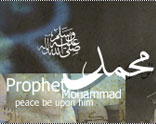According to authentic historical documents, the Holy Prophet (peace be upon him and his household) was brought up in an atmosphere which was the meanest environment for living and was the centre of ignorance, corruption, and moral vices. In such an environment and without academic education, the Holy Prophet (peace be upon him and his household) spent the period of his infancy and youth. Although the Holy Prophet (peace be upon him and his household) never worshipped an idol and was never involved with inhumane demeanours; nevertheless, he was among such people, and his ordinary life did not indicate such an eventful future; indeed it was unbelievable on the part of a poor, unschooled, and inexperienced orphan.
The Holy Prophet (peace be upon him and his household) spent some time in this way until during one night, while worshipping Allah with usual peace of mind and freedom from worldly affairs, he suddenly gained a different personality. His quiet inner personality converted into a divine one. The Holy Prophet (peace be upon him and his household) regarded the thoughts and beliefs of thousands of years of human societies as superstitious. With his realistic views, he considered the customs and rites of the inhabitants of the world as cruel and unjust. He linked the past and the future of the world and fully recognized the path of man's prosperity. His observations and vision changed totally. He did not see or hear anything except the truth and reality. He began to speak of divine and heavenly words, wisdom, and guidance. His natural state of mind which was occupied with reforming daily routines in a poor atmosphere of trade and transaction grew stronger and, so he embarked on reforming the world and its inhabitants and subverting the thousands of years old organization of human aberration and cruelty. He rose to revive the truth and reality all by himself and challenged the terrifying and intense opposing forces of the world as if they were nothing. He talked about divine teachings and derived all the realities of existence from the Oneness of the Creator of the world.
The Holy Prophet (peace be upon him and his household) described the sublime human ethics in the best possible manner and comprehended and clarified their relationships. He first believed what he said to anyone else. Also, he first carried out whatever he asked the people to do.
The religious laws and precepts brought forth by him consist of a series of worships and services which beautifully express the servitude of man towards the grandeur and power of the Almighty Allah. He brought other laws such as legal and penal laws which are completely interrelated and which are established on the basis of monotheism and respect for the sublime human ethics.
The set of laws brought by the Holy Prophet (peace be upon him and his household) on worships and transactions is so comprehensive that it deals with every aspect of individual and social life that can be conceived of in the world of humanity, as well as various needs and requirements resulting from the lapse of time and issues instructions to fulfil them.
The Holy Prophet (peace be upon him and his household) considered the laws of his religion as universal and everlasting, i.e. he believed that his religion is capable of eliminating the worldly and heavenly needs of all human societies for ever. He thought that the people must adopt the same stance in order to secure their prosperity.
He frequently stated:
"The religion that I have brought guarantees your worldly and heavenly prosperity and happiness."
Surely, the Holy Prophet's (peace be upon him and his household) statement was not in vain and groundless, rather he arrived at this conclusion after studying the creation and foreseeing the future of the human world. In other words, firstly, after he recognized the complete harmony and coordination between his laws and the physical and mental creation of man and secondly, after he generally considered the changes that would take place in the future and the harms that would be done to the Muslim society, he passed a judgement on the durability and perpetuity of his religious precepts.
The prophecies of the Holy Prophet (peace be upon him and his household), that have reached us through authentic documents, have described the general circumstances and conditions after his passing away up to the remote future.
The Prophet (peace be upon him and his household) performed all these tasks in a period of twenty three years, out of which, he spent thirteen years under severe torture and harassment of the unbelievers of Makkah. He spent the remaining ten years in battles, campaigns, and external struggles against overt enemies; in domestic campaign against the munafiqin and trouble-makers; and the management of the affairs of the Muslims, the reformation of their beliefs, ethics, and deeds, and thousands of other involvements.
The Holy Prophet (peace be upon him and his household) achieved so much due to his firm resolution in pursuit of truth and its revival. His realistic views were only directed to truth. He did not follow what was contrary to truth even if it was in his own interest or in the interest of the public. He accepted wholeheartedly what was true and never refused it. On the other hand, he refused whatever was false and never accepted it.
THE SPIRITUAL PERSONALITY OF THE HOLY PROPHET (p.b.u.h) WAS EXTRAORDINARY
If we impartially consider the subject already covered we will have no doubt that the appearance of such a personality in those conditions and circumstances was nothing but an extraordinary occurrence and miracle and had no reason other than the special support by Allah. Therefore, the Almighty Allah repeatedly mentions in Qur'an about the earlier unschooledness, orphanage, and poverty of the Holy Prophet (peace be upon him and his household).
The Almighty Allah states:
﴾Did He not find you an orphan and give you shelter? And find you unable to see and show the way? And find you in want and make you to be free from want? (93:6-8).﴿
Allah also states:
﴾And you did not recite before it any book, nor did you transcribe one with your right hand...(29:48).﴿
Again the Almighty Allah states:
﴾And if you are in doubt as to that which We have revealed to Our servant, then produce a chapter like it...(2:23)﴿
THE CHARACTER OF THE HOLY PROPHET (p.b.u.h.)
The only basis and principle upon which the Holy Prophet (peace be upon him and his household) laid the foundation of his religion is the principle of Tawhid which he recognized as the source of the prosperity for the people of the world.
According to the principle of Tawhid only Allah is the Creator of the world and worthy of being worshipped. We must not bow down and pay homage to anyone except the Almighty Allah.
Thus the principle that must be practised in human societies is for all to act like brothers and be equal with one another and not to regard anyone as their unconditional sovereign except Allah.
As the Almighty Allah states:
﴾Say: O followers of the Book! come to an equitable proposition between us and you that we shall not serve any but Allah and (that) we shall not associate aught with Him, and (that) some of us shall not take others for lords besides Allah... (3:64).﴿
The Holy Prophet (peace be upon him and his household) pursued no objective other than the propagation of the religion of Tawhid. He invited the people to Tawhid by the best morality, the most cheerful disposition, and, the most convincing reasoning and proof. He also advised his friends to follow the same principle accordingly.
As the Almighty Allah issued His order upon him:
﴾Say: 'This is my way I call to Allah, and those who follow me being certain...(12:108).﴿
On the basis of his character, the Holy Prophet (peace be upon him and his household) regarded all people as brothers and equal to one another. He never showed prejudice in carrying out the divine precepts and penance. He did not discriminate between his acquaintance and the stranger, the weak and the strong, the rich and the poor, the man and the woman, the black and the white. He provided the people with their rights on the basis of the precepts and laws of religion and states: "Even if my daughter Fatimah, who is the most beloved of all people for me, commits a theft, I will cut off her hand."
No one had the right of domineering, commanding, and oppressing others. The people enjoyed the utmost freedom outside the domain of the law (certainly freedom against law bears no meaning not only in Islam but also in any other social order).
This freedom and social justice is stated by the Almighty Allah in introducing His Holy Prophet (peace be upon him and his household).
"Those who follow the Messenger Prophet, the Ummi, whom they find written down with them in the Tawrat and the Injl, (who) enjoins them good and forbids them evil, and makes lawful to them the good things and makes unlawful to them impure things, and removes from them their burden and the shackles which were upon them; so (as for) those who believe in him and honour him and help him, and follow the light which has been sent down with him, these it is that are successful. Say: ﴾O people! Surely I am the Messenger of Allah to you all'..(7:157-158).﴿
This is why the Holy Prophet (peace be upon him and his household) desired no privileges for himself in his life. One could never tell that the Holy Prophet (peace be upon him and his household) differentiated from other people someone having a former acquaintance with him. The Holy Prophet (peace be upon him and his household) managed the chores of the house, welcomed everyone in person, and listened to those who turned to him out of need. He did not sit in the position and seat of honour. He did not have any means of riding and official protocol for moving from one place to another. If he earned some money, he would give to the needy over and above his necessary expenses.
At times, he gave even his least available money to the needy and lived with hunger. He always lived like the needy and associated with them. He did not display the slightest procrastination in granting the rights of the people, but he used the maximum connivance and condonation for his personal rights. When the dignitaries of Quraysh were brought before him after the conquest of Makkah, he did not display the slightest harshness and pardoned them all, although they had treated him most cruely before the Hijrah and had even provocated sedition after the Hijrah.
In his humane ethics and virtues, the Holy Prophet (peace be upon him and his household) was conspicuously recognized among friends and foes. He was matchless in sociability, cheerfulness, forbearance, modesty, soberness, and dignity. As the Holy Qur'an has praised his munificent conduct by a statement:
﴾And most surely you conform (yourself) to sublime morality (68:4).﴿
He took the lead in greeting those whom he met, even women, children, and subordinates. One of his friends asked his permission to bow down, i.e., to prostrate in front of him.
The Holy Prophet (peace be upon him and his household) stated: "What do you mean? These are the customs of Caesar and Casra. And I am for prophecy and servitude".
Ever since he was appointed to a mission by Allah to propagate the religion and to guide and lead the people, the Holy Prophet (peace be upon him and his household) did not neglect his duty for a moment and did not refrain from his untiring efforts. Thirteen years before the Hijrah, when he was in Makkah although he faced unbearable difficulties caused by the Arab polytheists, the Holy Prophet (peace be upon him and his household) was constantly engaged in the worship of Allah and the propagation of the religion of Allah. During the ten years after Hijrah, the Holy Prophet (peace be upon him and his household) conveyed the teachings of religion and the laws of Islam with its amazing enormity to the people, despite the ever-increasing troubles made by the enemies of religion and the hindrances caused by the Jews and munafiqin pretending to be Muslims. The Holy Prophet (peace be upon him and his household) also fought more than eighty battles with the enemies of Islam.
In addition to handling the affairs of the Islamic society which at that time included the whole Arabian Peninsula , the Holy Prophet (peace be upon him and his household) personally looked into the complaints and minor requirements of people without a doorkeeper and chamberlain attending on him.
With regard to the bravery and courage of the Holy Prophet (peace be upon him and his household), it suffices to say that with his rightful invitation, he rose all alone against the world of that time which ruled the people with nothing other than coercion and injustice. All the tortures and sufferings inflicted on him by the oppressors never produced weakness and disappointment in him. He never retreated in any battle.
Well Dressed, Well Mannered Combined with Modesty
The Holy Prophet (peace be upon him and his household) kept himself very clean and neat. He considered cleanliness and neatness as a sign of faith.
"Cleanliness is a part of the belief."
In addition to the cleanliness and neatness of his clothes and body, the Holy Prophet (peace be upon him and his household) was well-dressed and well-behaved also. Whenever he wanted to leave the house, he would set out in the best outward appearance. He particularly liked to use perfumes.
He never changed his disposition in the course of his life. His life came to an end with the same modesty and humbleness. Although he had such a valuable position, he never gave preference to himself to demonstrate his social value.
During his lifetime, the Holy Prophet (peace be upon him and his household) never insulted anyone and never used empty remarks. He never laughed boisterously and never performed disrespectful and worthless deeds. He was highly interested in thinking and reflection. He listened to the remarks of every afflicted person and the complaints of every protestor and then replied. He never interrupted the speech of others and never marred the freedom of thought; however, he clarified their mistakes and eased their discomfort.
The Holy Prophet (peace be upon him and his household) was very kind and tenderhearted and was always saddened by sufferings; nevertheless, he did not waver in punishing the criminals and the wicked and did not discriminate between the individuals in carrying out the divine laws.
Once a Jew and a Muslim were accused of a theft in the house of one of the Ansar. In this connection, a great crowd of Ansar went to the Holy Prophet (peace be upon him and his household) and insisted that the Jew be punished for the sake of the prestige of the Muslims, specifically the Ansar and keeping in view the overt enmity of the Jews. Since the Holy Prophet (peace be upon him and his household) discovered the truth contrary to what they had demanded, he openly supported the Jew and punished that Muslim man.
Amidst the throes of the Battle of Badr, when the Holy Prophet (peace be upon him and his household) was personally organizing the arrays of the division, he saw a fighter standing a little bit ahead of the others. The Holy Prophet (peace be upon him and his household) pressed his stick at the belly of the man to move him back a little and get him in line with others. The fighter said, "O, Messenger of Allah! I swear by Allah that my stomach is hurt and I should go for qisas (Islamic reprisal)". Giving the stick to the man, the Holy Prophet (peace be upon him and his household) pushed his dress aside from his stomach and said, "Go for qisas". The man ran towards the Holy Prophet (peace be upon him and his household), kissed his stomach, and said, "I know that I will be killed today and I wanted to touch your holy body". Then he attacked the enemy and stroke with his sword until he was martyred.
The Holy Prophet (peace be upon him and his household) always patronized the weak and the oppressed and urged his friends to inform him of the exigency of the needy and of the complaints of the weak and not to procrastinate in this regard.
It is related that the Holy Prophet's (peace be upon him and his household) last words were a recommendation to the people regarding the slaves and women, after which he ceased speaking and passed away. Peace be upon him and his holy family.
THE HOLY PROPHET'S (p.b.u.h.) LAST WILL TO THE MUSLIMS
The world of humanity, like other components of the world of existence, is subjected to change and transformation. The intense differences seen in the structure of human beings have generated various tastes, as a result of which people vary in the quickness and dullness of perception and comprehension and in the retention and forgetfulness of thoughts.
Thus beliefs, customs and traditions which govern a society will be subject to change and distortion in the shortest time and will be eliminated, unless they have a stable root and trustworthy and reliable guardians. By observation and experience, this matter will be thoroughly clear to us.
To safeguard against this danger, the Holy Prophet (peace be upon him and his household) introduced a strong and steady document and qualified guardians for his universal and everlasting religion and recommended the Divine Book (Holy Qur'an) and the Ahl al-Bayt (AS). Thus all Islamic sects, as concatenation, have related that the Holy Prophet (peace be upon him and his household) had repeatedly stated:
"I entrust you with two valuable things, one of which is the Holy Book (Qur'an) and the other my Ahl al-Bayt. These two will never be dissociated from each other and you will not be led astray as long as you will remain associated with them".



















